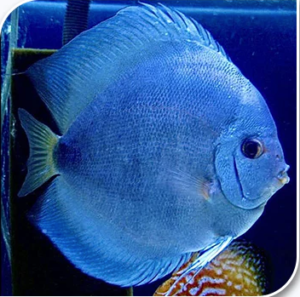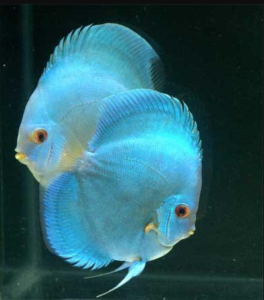Blue Discus Fish Breeding and Care Tips

Blue Discus Fish
Blue Discus Fish Breeding Caring Tips
Blue discus fish are a popular aquarium fish, and for good reason. They’re beautiful to look at, easy to care for and fun to watch.
This guide will teach you everything you need to know about blue discus fish: their characteristics, breeding tips for beginner aquarists and more!
Characteristics of Blue Discus Fish
Blue discus fish are known for their bright blue color, but there are many varieties of this species that can be found in the wild. Some of these include red, yellow, green and white. In addition to their beautiful colors, discus fish have other physical characteristics that make them stand out from other types of aquarium fish.
Body and Shape of Blue Discus Fish
The body shape of a blue discus is oval-shaped with a pointed head and dorsal fin running along the back side of its body. The caudal fin (tail) is slightly rounded at the end and has an orange hue when viewed under direct sunlight or other bright lights like those found in your home aquarium setup. Discus fish come in sizes ranging anywhere from 1 inch long up to 6 inches long! However if you’re looking for something smaller than 2 inches then I would recommend starting with baby fry instead since they grow much faster than adults do while still being easy enough care for beginners like yourself 🙂

Blue Discus Fish
Breeding Blue Discus Fish
Breeding Discus fish is a challenging and rewarding experience. It requires patience, dedication, and lots of research. The first thing you need to do is make sure that your aquarium is ready for breeding before you even think about introducing any new fish into it.
In order for your Blue Discus Fish to breed successfully, they need an environment with plenty of hiding places and plants for them to rest in during the day when they’re not feeding or courting mates. You should also provide plenty of room so they have room to swim around freely; otherwise they’ll feel stressed out by being too cramped up which could affect their ability to reproduce properly later on down the road!
You may have heard some people say that having two males together makes them fight more often than usual; however this isn’t always true since sometimes one male will dominate another without ever actually attacking him physically (although sometimes there might be minor injuries). So if possible try not putting two males together unless both parties agree beforehand since there’s no guarantee as far as outcomes go here either way!
Caring Tips for Blue Discus Fish
-
Provide a tank size of at least 20 gallons for one discus, and 30 gallons for two or more.
-
Keep the water temperature between 75 and 82 degrees Fahrenheit (24-28 Celsius).
-
Feed your discus a high-quality diet that includes live food such as brine shrimp, bloodworms and tubifex worms in addition to flake foods. Feed them once or twice per day depending on their appetite–they should eat all they want within 10 minutes of being offered food at least once per day. You can also offer freeze-dried krill pellets as an occasional treat if you wish; however these are not necessary for proper nutrition but may be enjoyed by your fish nonetheless!
Blue Discus Fish are awesome
Blue Discus Fish are a popular aquarium fish that can be found in many homes and businesses. They are beautiful, colorful, and easy to care for. However, it’s important to remember that they are still living creatures with needs. They need proper care and attention in order to thrive in your aquarium.
If you have any questions about Blue Discus Fish or would like to share your experiences with them please leave a comment below!
Free Reports
- Cockatiel Sounds: What Type of Sounds Do Cockatiels Make?
- Cane Corso Lab Mix: What You Need To Know Before Adopting Your New Cane Corso Lab Mix
- Belgian Malinois Grooming: How to Properly Care For Your Belgian Malinois
- Hamster Vomiting: What You Need To Do When Your Hamster is Vomiting
- Manchester Terrier Price: What You Should Before Adopting Your Manchester Terrier
- Boerboel Life Span: How Long Do Boerboel Dogs Usually Live?
- Canaan Dog Price: Everything You Should Know About Canaan Dogs Before Adopting
- Do Cane Corso Shed: How Much Cane Corsos Shed and How to Prevent Shedding
- Cane Corso German Shepherd Mix: Everything They Don’t Tell You About This Unique Mix
- Cane Corso Doberman Mix: Check Before You Buy! What They Don’t Tell You About Cane Corso Doberman Mixes
- Brindle Cane Corso: What You Need to Know Before Adopting
- Cockatiel Eye Problems: What to Do When Your Cockatiel Has an Eye Infection
- Top 25 Sun Conure Names: How to Name a Sun Conure, Care Tips and Tricks
- Friesian Horse Price: Everything You Need to Know Before You Buy a Friesian Horse
- Friesian Colors: The Uniqueness of Every Friesian Horse Color, Price and Care Tips